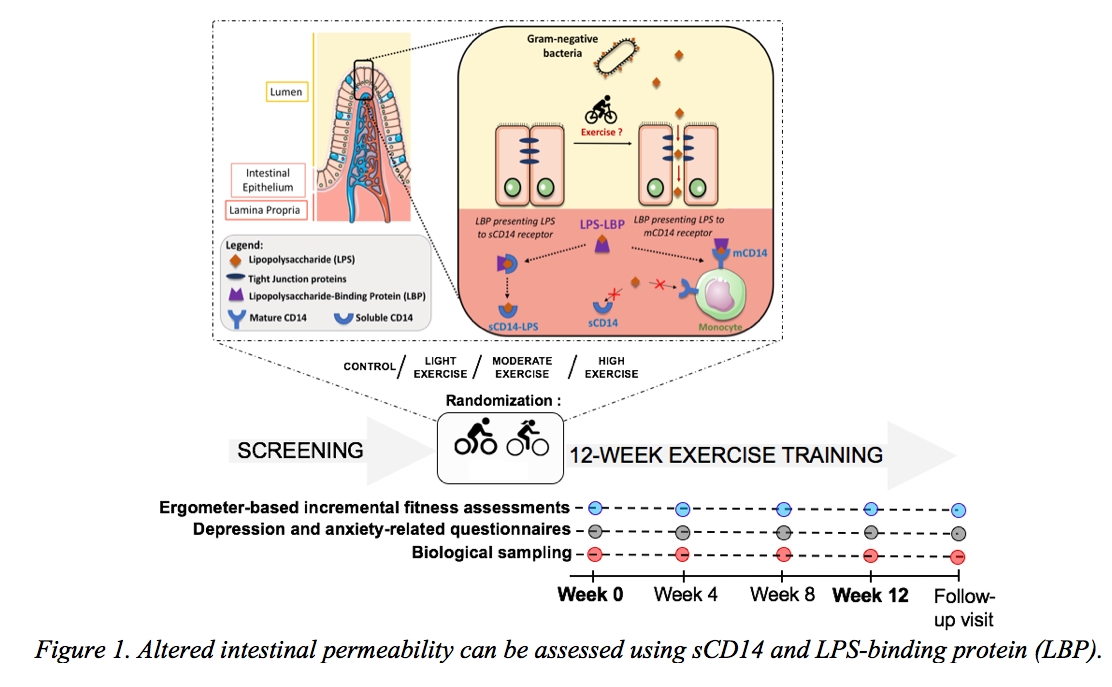Background/objective: Exercise exerts beneficial effects in depression with a number of mechanisms proposed. There is a substantial overlap between these biological pathways and those regulated by the gut microbiota via the gut-brain axis, including via the regulation of tryptophan metabolism. The physiological impact of exercise may also manifest as hormetic effects on gastrointestinal permeability, acting initially as an acute stressor that subsequently stimulates positive adaptation to support good mental health. Indeed, alterations in barrier function can impact the central nervous system via gut-brain axis signaling pathways including tryptophan metabolism. Evidence of an association between stress-related psychiatric disorders including depression, microbiota composition and increased intestinal permeability levels is accumulating. This study aims to assess the impact of exercise training intensity on gastrointestinal permeability and stress level in sedentary healthy controls, both acutely and chronically over a 12-week duration. Methods: Monthly fitness and psychometric assessments were performed throughout a 12-week exercise program in 35 sedentary healthy adults (3-sessions/week). Intestinal permeability was assessed in plasma samples, pre-exercise, and one-hour post-exercise, for each monthly visit using Lipopolysaccharide binding protein (LBP) and soluble cluster of differentiation 14 (sCD14) protein as biological markers (figure 1). Additionally, we investigated the dose-dependent nature of exercise upon measures of stress, anxiety, and depression. Results: Preliminary analyses show that a 12-week exercise program resulted in significant increases in fitness (p<0.05) and performance (p<0.001), with modest reductions in reported levels of stress (p= .08) and depression (p= .06). Acutely, intestinal permeability markers (LBP; sCD14) were unchanged one-hour post the monthly fitness assessment. Chronically, we observe a significant effect of training (p= <0.05) and significant training x exercise group interaction (p<0.05) in LBP concentration levels, which were increased in the high-intensity group only. Conclusions: Recent clinical and preclinical research charting the impact of exercise on the microbiota-gut-brain axis as a potential mediator of the benefits for mood and cognition. Our preliminary data shows that 12-weeks exercise training has a modest impact on intestinal permeability. Further research is needed to understand the CNS implications of exercise-induced alterations in gastrointestinal physiology and gut-brain axis signaling, and to understand how this integrates with the beneficial effects of exercise in modulating stress and depression. Ethical Standards: Approval of the study protocol was granted by the Clinical Research Ethics Committee of the Cork Teaching Hospitals and written informed consent was obtained from all subjects. The study was carried out in accordance with the Declaration of Helsinki. All experiments were in full accordance with the EU legislation (Directive 2010/63/EU).
Physiology 2021 (2021) Proc Physiol Soc 48, SA36
Research Symposium: Exercise and the microbiome-gut-brain axis: moving beyond tryptophan metabolism
Cassandra Elise Gheorghe1, 2, 3, Jason A. Martin1, 3, Ali Lynch1, 4, Francisca Villalobos-Manriquez1, 3, Michael Molloy5, Ken O'Halloran6, Timothy G. Dinan1, 3, John F. Cryan1, 2, 3, Gerard Clarke1, 3, 7
1 Department of Psychiatry and Neurobehavioural Science, Cork, Ireland 2 Department of Anatomy and Neuroscience, Cork, Ireland 3 APC Microbiome Ireland, Cork, Ireland 4 School of Medicine, Cork, Ireland 5 Department of Medicine, Cork, Ireland 6 Department of Physiology, Cork, Ireland 7 INFANT Research Centre, Cork, Ireland
View other abstracts by:
Where applicable, experiments conform with Society ethical requirements.

